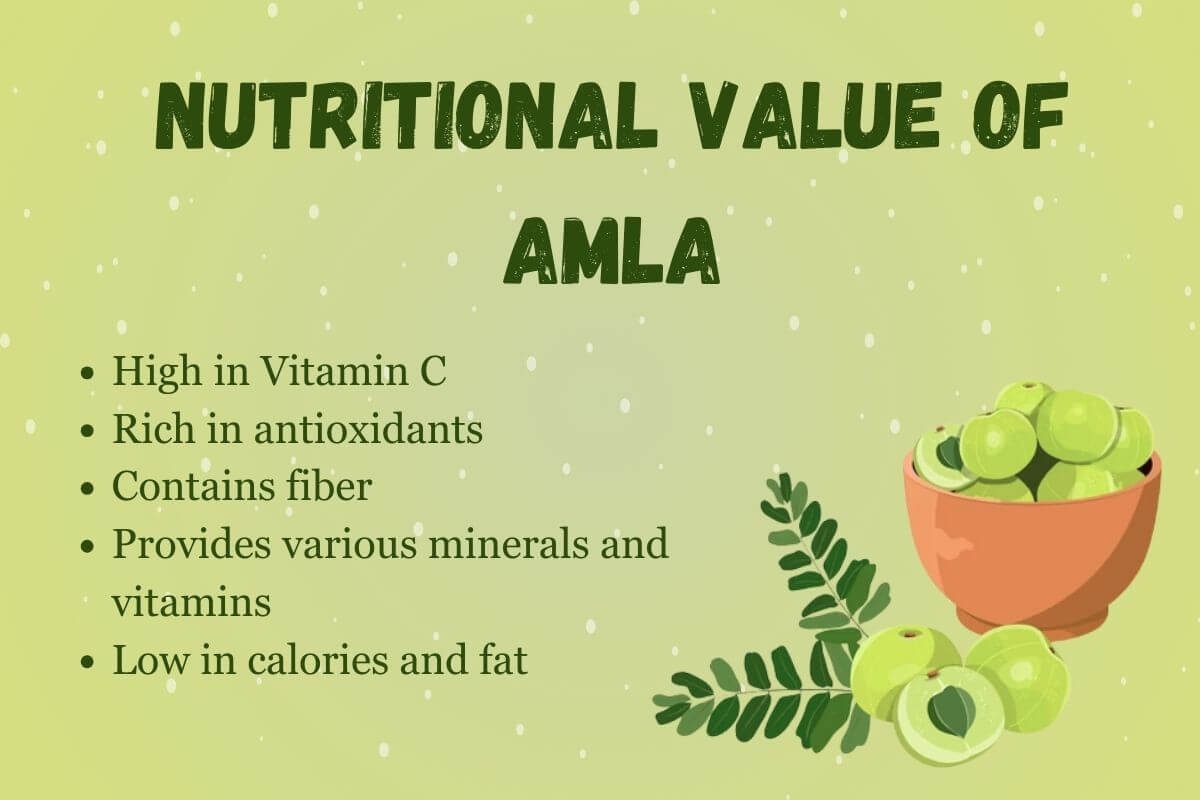
Amla Health Benefits: Uses, Side Effects and More
Information on amla dates back to the Vedic era. The benefits and uses of amla exist in the ancient texts. It is a rich storage of Vitamin C. It is known to have antioxidant properties and has been appreciated for its medicinal properties and nutritional values everywhere in the Indian subcontinent and in different parts of the world.
The nutritional value of 100gm of amla or gooseberries is equivalent to that of 20 oranges. Gooseberries are small, and round with a greenish or yellowish color. It is a superfruit and you can prepare different culinary dishes to boost your health. With a little bit of bitterness and more sour and sweet qualities, it makes a positive impact on your health.
What is Amla?

Scientifically known as Phyllanthus emblica, and Commonly known as Indian Gooseberry, Amla belongs to the family of Phyllanthaceae, a subtropical fruit small in size, round in shape with a yellowish or green color, it has the richness of all types of nutrients to nourish the health of men and women.
Its uses have been mentioned in the traditional aspects of Ayurveda. It covers the health benefits of digestion, immunity, skin and hair. Its tangy and sour nature arouses the desire of anyone to eat it either raw or in pickled form. Many use amla powder for preparing smoothies, tea, soups and stews. Chutneys and jams made from amla extracts also balance the metabolism and boost immunity conditions.
Clinical claims to not use the amla during the night. Otherwise, it may cause acidity and other stomach problems. However, one can see rejuvenating and revitalizing benefits if suffering from diabetic conditions, heart problems and cancer. Its anti-inflammatory properties help in boosting the liver condition.
Further research is going on to understand well enough potencies and connecting risks of using amla orally and applying it in the form of cosmetics.
History and Traditional Uses of Amla

Amla or Amalaki in Sanskrit relates to the historical past of thousands of years in Ancient India. It finds its way into sacred texts of Hindu scriptures for its revitalizing and nourishing properties for mankind. It is believed to have a spiritual impact on human beings; therefore, the tree is worshipped during the occasion of Kartik Navami, and its fruits and flowers are used on the holy occasion.
Let’s study the applications of Amla in the ancient past and in the present era:
- An Ancient Ayurvedic Remedial Measure: Its essence has been mentioned in the ancient scriptures of Purana for its purity and its ability to stimulate spiritual awakening. As mentioned in Charaka Samhita, it is known for balancing all the doshas. Rasayana quality of Amla helps in fighting against the toxins in the blood.
- Nutritional and Therapeutic Properties: Abundance of Vitamin C, and B, Calcium, Iron, Phosphorus, Proteins and fiber found in Amla or Indian gooseberry nourish the body and boost strong defense mechanisms.
- Revitalizing Digestive Health: It helps in controlling gastrointestinal problems and bloating of the stomach. And so it aids easy digestion.
- Promoting Excellent Hair and Skin Condition: Amazing benefits of Amla have triggered its frequent uses in the preparation of conventional hair and skin care products. Amla oil, amla-based hair masks and skin care preparations are in huge demand among people even today in the age of modern cosmetics brands.
- Liver and Diabetes Management: It boosts detoxification of the liver and helps in increasing glucose tolerance and insulin sensitivity.
- Ensures Thorough Wellness: Ultimately, the Amla fruit that we consume happens to be packed with antioxidants, anti-inflammatory properties and all the goodness to boost long life. It is assumed that regenerating the new cells reinforces strength and vitality.
Traditional uses of Amla have been recorded and so studies are going on to prove its usefulness in the contemporary period. One can consult the health care expert for using and applying amla in a personalized way.
Nutritional Value of Amla

Its richness in anti-inflammatory and antioxidant properties encourages people to use it in a wide variety of medicinal preparations. The extracts of Amla fruit are used for juicing or drying and later ground into powder, made into tablets and capsules. Studies highlight the information concerning different types of antioxidants like phenols, flavonoids and tannins. You will not find as much richness of Vitamin C in 20 oranges as in Indian gooseberries.
Amla Benefits for Health

Conventional uses of Amla have been well mentioned in Charaka Samhita and ancient Hindu scriptures.
Boosts Immunity
With the property of cytoprotection, it prevents any kind of damage to mucus and improves the flow of blood through the gut. It does not let ulcers develop in the stomach and improves the production of white blood cells. Oral use of Amla or Indian gooseberry will aid in releasing toxins from the body.
Try Ayush Kwath to boost your Immunity with Ayurveda.
Protects Against Heart Disease
Just like its potent ayurvedic counterpart Neem, It helps in cleansing blood vessels and thus boosts circulatory health. With its antioxidant properties, it lowers lipid levels and reduces high cholesterol and thus preventing the possibility of heart attacks.
Promotes Weight Loss
Obesity is one of the most prevalent lifestyle diseases which is place a detrimental role in major diseases like diabetes, high blood pressure and cardiovascular. Vitamin C is known for burning fats in the body and reducing toxins. High quantities of Vitamin C existing in Amla will surely reverse the accumulation of fats and cholesterol in the body. Moreover, the high-quality fiber in Amla shows results in controlling appetite.
Improves Digestion
Amla also know for Improve Digestion, It invokes gastric juices to regulate digestion and aid in absorbing other nutrients. Its richness of fiber in amla brings relief from irritable bowel syndrome, constipation and diarrhea.
Regulates Blood Sugar
A good amount of Chromium in Amla enables the body to be more responsive to insulin and manage carbohydrate absorption. The high amount of Vitamin C in Amla helps in burning fats and sugar in the bloodstream. And promoting balance in the mechanism of the body. It also helps in Gestational Diabetes.
Reduces Inflammation
Its richness in Vitamin C reduces the destruction of cells and helps in the development of new cells. Vitamin C is a storehouse of antioxidants and therefore one would not see himself or herself from inflammatory conditions in any part of the body. And Amla can also help in curing knee pain in young adults due to aggravated vata.
Protects Against Cancer
Apart from anti-inflammatory and antioxidant properties, amla does have an abundance of bioactive compounds and minerals to manage cancer cells. It aids in managing the toxic effects of radiation and chemotherapy and boosts a new lease of life for cancer patients.
Delays Aging
It does not let the free radicals accumulate in the body and contributes to maintaining youthfulness and energy balance. It delays the aging process by preventing any cell damage.
Improves Skin and Hair Health
It is equally good for skin and hair problems which may be dandruff, managing hair fall and split ends. It possesses multiple rejuvenating natural compounds, minerals and vitamins to strengthen the hair follicles and enable dense and thick hair growth. It is also used in the preparation of herbal dyes for gray hair coverage.
Amla for Metabolism
It aids in stimulating the defensive mechanism to control the production of free radicals in the body, cleanse the toxins, and microbes, regenerate cells and balance doshas.
Good For Skin
It's rich in antioxidants and Vitamin C helps in removing dark spots, pimples, or any form of blemish make a glowing skin. It serves as an astringent against the accumulation of dead cells and protects from sunburns.
Healthier Eyes
It is revitalizing the effects of high Vitamin C and Vitamin A in the Amla which boosts clean eyesight. It stops the growth of cataracts and prevents macular loss.
Memory and Brain Health
A High concentration of Vitamin C and even Vitamin E revitalizes the brain cells and sharpens memory. Clinically analyzed to heal the patient successfully from Alzheimer’s disease. Further high levels of antioxidants and flavonoids control stress and enable logical reasoning and decision-making.
Help with Alcohol Recovery
Amla has been used traditionally as an improtant ayurvedic herb in treatment of ill effects of alcoholism. It has rich antioxidant properties which helps boost immunity. Its antioxidant properties aids digestive process and absorption and hleps detoxify.
Try Addiction Killer or Addiction Killer Liquid to get rid of Alchol addiction.
Nutrients Per Serving

Consuming 100 gms of Amla or two Amla or Indian Gooseberries will help you to get the following nutrients:
- Vitamin C: May vary between 440 mg and 800mg
- Vitamin A: 290IU
- Vitamin E: 0.16mg + or -0.05mg
- Fiber: 5gms of fiber
- Calories: 48
- Carbohydrates: 10gms
- Fats ( including Omega 3 fatty acids and Omega 6 fatty acids) : 0.5,mg
- Proteins: 1g
- Water: 86 g
Also, there are very small percentages of Vitamin B6 and Vitamin B12
Science Backed Amla Benefits for Health

Scientific analysis of discovering the benefits of Amla is a continual process. There are a variety of research studies done on Amla which involves phytochemical studies, in vitro, clinical and human studies.
Every research or study on Amla fruit concludes about its extent of effectiveness in altering a variety of life-threatening diseases which may even be cancer.
Phytochemical Analysis
Studies[1] check the bioactive ingredients and verify their impact on health. Such bioactive ingredients are Vitamin C, Polyphenols, Flavonoids and Tannins.
In Vitro Studies
To get detailed information on Amla benefits, in vitro studies are conducted on isolated cells in the laboratory at specific temperatures and pressures. The compounds or extracts of Amla are used for studying their antioxidant and anti-microbial activities.
Animal Studies
Certain tests[2] are conducted on laboratory animals to verify the efficacy of the compounds of Amla on biochemical and physiological levels. It is used to determine the metabolic changes, immunity and disease models.
Human Studies
Tests are conducted on humans by administering them a certain amount of amla extract. It is the responsiveness of humans to amla that determines how amla can stabilize blood sugar, cholesterol and skin conditions. It can also be a good
Epidemiological Studies
It involves research[3] on the extent of utilization of amla among large numbers of people. Studies are further conducted to check the diet of every individual along with his or her health condition and correlate the effectiveness of amla in stopping the development of any disease.
Comprehensive Review
The potential benefits of Amla along with its side effects are studied and recorded based on evidence-based findings. Information is also recorded for areas for further exploration.
Amla Side Effects

One can experience Amla benefits if taken in appropriate amounts or dosage. So, it might cause adverse health effects if not taken in counted measures.
Let’s understand the side effects of using Amla
May Interact With Certain Medications
It may reveal negative reactions if taken with anti-diabetic medications for low blood sugar. Pregnant women must avoid taking amla. It requires medical advice from the doctor if the desire arises. Otherwise, constipation arising from the intake of amla may be a problem for any woman during pregnancy.
May Cause Stomach Upset in Some People
As Amla or Indian Gooseberry is regarded as an abundant source of Vitamin C, it may interfere with the stomach function by raising the level of acidity. Levels of acidity would be higher if consumed during the night.
May Lower Blood Sugar Levels Too Much in Some People
In highly concentrated amounts or extracts, amla if taken regularly would cause the risks of low blood sugar and its related complications like fatigue, dizziness, lack of concentration and confusion.
May Increase the Risk of Bleeding in Some People
It should be strictly avoided by people who are suffering from blood-related disorders. The antiplatelet property of Amla will not help in the clotting of blood or drying and cause excessive flow of blood.
How to Consume Amla

Fresh Amla Fruit
You must have a maximum of 100 gms each day and that might be 2 Indian gooseberries.
Amla Juice
Juicing one or two Amla, adding water and jeera will help boost amazing health benefits.
- Promoting healthy stomach and liver functions.
- Relieving from rising blood sugar.
- Boosting healthy weight loss.
Amla Powder
Depending on your taste and individual requirements, you can add or consume Amla powder to food or juice within a range of 1 teaspoon to 1 tablespoon. You can also use 3 tablespoons of amla powder with 4 tablespoons of henna to boost dense and dark hair growth.
Amla Supplements
It is known for boosting revitalizing health if taken on an empty stomach. However, consulting a doctor is necessary to get the ultimate health benefits of Amla. Consuming in large quantities, amla supplements may show up with adverse effects for pregnant and breastfeeding women.
Conclusion
Information regarding the therapeutic effects and nutritional benefits of amla has been passed on from our ancestors. Its importance in the spiritual aspect and ability to heal critical diseases have been recorded in the ancient texts. It is the abundance of Vitamin C, Iron, Protein, Omega 3 and 6 fatty acids, fiber and phosphorus in amla that nourish our health and promote thorough wellness.
Finally, it is necessary to note that Amla possesses all the goodness that any person expects to restore his or her health. It helps in the cell renewal process with its antioxidant and anti-inflammatory properties.
Thus it has been found highly effective in adding radiance to the skin, strengthening the root of the hair and boosting the defense mechanisms of cancer and diabetic patients. Studies have also alerted about the use of amla in a moderate way or as per the potency and health condition of the person. It will aid in avoiding the adverse effects of amla.



